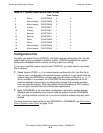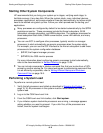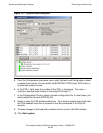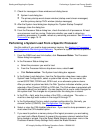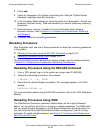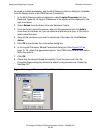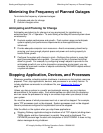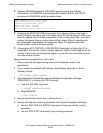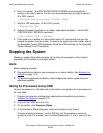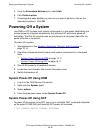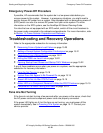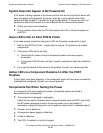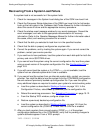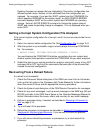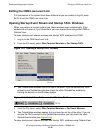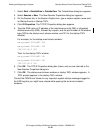
Starting and Stopping the System
HP Integrity NonStop NS-Series Operations Guide—529869-005
15-16
Stopping the System
6. Drain the spooler. The SPOOLCOM SPOOLER DRAIN command stops the
spooler in an orderly manner. It is the only recommended way to stop the spooler.
At a TACL prompt:
> SPOOLCOM supervisor-name, SPOOLER, DRAIN
7. Stop the TMF subsystem. At the TACL prompt:
> TMFCOM STOP TMF
8. Refresh the disks to put them in an orderly state before shutdown. Use the SCF
CONTROL DISK, REFRESH command:
> SCF CONTROL DISK $*,REFRESH
9. If the system is a member of a ServerNet cluster, HP recommends that you first
remove the system from the cluster. To remove the system from the cluster, refer to
the ServerNet Cluster 6780 Operations Guide (for 6780 switches) or the ServerNet
Cluster Manual (for 6770 switches).
Stopping the System
Stopping a system halts each processor (terminating all processes running in each
processor) on the system in an orderly fashion.
Alerts
Before stopping a system:
•
Stop applications, devices, and processes in an orderly fashion. See Stopping the
System on page 15-16.
•
To maximize application availability, make stopping the system a planned event
whenever possible.
Halting All Processors Using OSM
To place processors in a halt state and set the status and registers of the processors to
an initial state:
1. Prepare the system by shutting down applications and performing all tasks in
Stopping the System on page 15-16.
2. Log on to the OSM Low-Level Link.
3. On the toolbar, click Processor Status.
4. In the Processor Status dialog box, select all processors to be halted.
To select multiple processors, use the Shift key, but the processors must be in
numerical order. For example, you can select processors 2, 3, and 4, but not 2 and
4.



